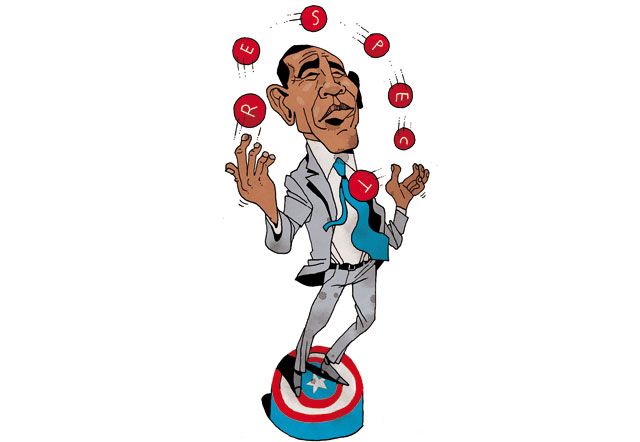A year after US President Barack Obama's victory in the 2008 US presidential election it is still far too early to call his administration a success or a failure. Our constantly-connected, constantly self-referential society loves to render snap judgments (and will, no doubt, spend much of this week doing so), but in the longer span of history these mean very little.
Nine months into his term opponents are railing at Obama for doing too much, while many of his most fervent supporters are equally unhappy because they believe he has done too little.
"We've learned that he can't walk on water," the Rev Al Sharpton, a long established African American leader and stalwart of the political left said on television recently. "But he's still the best swimmer in national politics."
For internationally-minded Americans — people who believe that being respected around the world is generally a good thing - it goes without saying that 2009 has been a better year than the six or seven that preceded it.
Unfortunately, it is probably fair to say that ‘internationally-minded' describes only a minority of Americans. Far larger in number are those who not only do not care what foreigners think, but believe that being admired overseas is evidence an American leader is not to be trusted. If a president's foreign admirers are European (Europeans, in the political right's mythology, are seen as cowardly and effeminate), so much the worse.
Obama's attempts to reach out to the wider world have, like everything else he does, met with withering criticism from his political opponents. The right accuses him, in particular, of embarrassing America by repeatedly "apologising" for the shortcomings of previous administrations.
Reasonable people can differ on these things, but I do not buy the idea that acknowledging a mistake makes one look weak. Some of us were raised to believe it is a sign of maturity.
Harder to fathom are those who argue, in essence, that because America is big and strong it has no need of friends. This theory holds that allies, even well-intentioned ones, merely tie a superpower's hands so, militarily and politically, America is better off acting unilaterally.
Need I recount the list of Bad Things this attitude has led to over the last eight years?
Where the right might have a point is in its contention that Washington's renewed commitment to global good citizenship has borne no real fruit. European leaders, it is argued, clearly find Obama a more pleasant colleague to deal with than George W. Bush but that has not led them to offer any substantive concessions in the run-up to next month's Copenhagen climate change summit, or to produce any more troops for Afghanistan (or loosen their rules governing the troops already there).
It is in the Middle East that this anti-global citizenship argument falls apart. A more collaborative approach to its allies has made Washington a stronger and more significant player in the recent P5+1 talks with Iran (in which Iran negotiates with a group consisting of the five permanent members of the UN Security Council, plus Germany). Because the US has been both involved and constructive in its approach — and because the other countries involved are not burdened with restraining Washington even as they try to talk with Tehran — the talks seem to have produced some real, albeit tentative, progress over the last few weeks. Surely this is an argument for productive engagement, rather than belligerent unilateralism.
The same can be seen elsewhere in the region: in Iraq the United States has enhanced its credibility by visibly disengaging from the day-to-day politics of the country.
On Israeli-Palestinian questions, presidential envoy George Mitchell has worked hard to mediate, rather than simply taking Israel's side. Even on relations with Syria, never an easy matter regardless of whether Republicans or Democrats are in charge in Washington, there has been an effort to engage, however chilly relations may still remain.
Whatever else Barack Obama has done in this last year he has worked hard to regain the respect America lost in so many quarters over the previous eight years. Put another way, in the world of international diplomacy it is not necessary that one be loved, and (let's be honest) it can be useful to be feared. But nothing replaces being respected; and respect is something one earns. Acknowledging that fact is the first step toward getting it back.
Gordon Robison, a writer and commentator who has lived in and reported on the Middle East for two decades, teaches political science at the University of Vermont.










